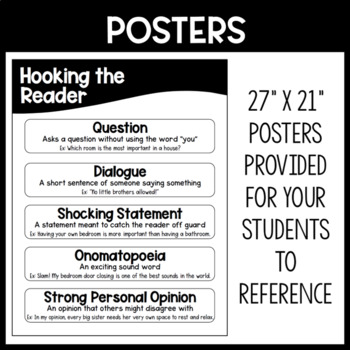
· As you can already imagine, an expository essay is a piece of writing where you talk at length about an important idea, present evidence and build an argument about that idea in a clear, impartial, and easily understandable way. Characteristics of an expository essay It explains or informs the reader about: how to do something · The common method of writing an expository essay is a 5-paragraph approach. However, this is not the only formula for writing expository essays but it provides a basic and clear outline for easy reading. This format gives the expository essay an introduction, 3 body paragraphs, and a conclusion, hence the name is a 5-paragraph approach · The 5-Step Process for Expository Writing 1. Prewriting: Expository Essay Topics. The first phase of the writing process involves brainstorming for ideas and 2. Expository Essay Outline. Creating an outline is vital, regardless of the type of paper you were assigned to do. 3. Drafting. Once you
How to Write an Expository Essay: Topics, Outline, Examples | EssayPro
by Yen Cabag 2 comments. Writing essays is an important skill for students of all ages, from third graders to degree-seekers. The more adept you become at writing an essay, the better your chances of getting a higher grade or getting into the best schools. But even in the workforce, having advanced research and reporting skills expository writing guide be a significant advantage, since your supervisor may ask you to write up reports or present your research on a given topic.
Different kinds of essays require different kinds of content. To review, the most common types of essays include:. In this article, we will be taking a close look at expository essays. To learn about establishing background information in a story, check out our post on narrative exposition.
An expository essay is a type of essay wherein the writer investigates and expounds on an expository writing guide, evaluates evidence, expository writing guide, and expository writing guide an argument about that idea in a clear and expository writing guide manner. Expository essays can come in many different forms, depending on the goal of the writer: do you intend to explain something, or to show how one thing is better than another? Are you tasked with explaining how something works or how to make something?
This type of expository essay is meant to describe a place, an experience, or a concept by appealing to the senses. The topic might be anything from a concrete object like an animal, city, or tree, or it can also be an abstract idea, such as relationships, love, or freedom.
This type of essay explains the process of doing or making something. An effective way of doing this is to include the steps that the reader can take. This essay compares and contrasts at least two different things, places, people, or ideas. This includes highlighting their similarities, as well as illustrating their differences.
A good way of writing this type of essay is to pick themes around which to make your comparisons. For example, in comparing two cities for livability, you may want to compare populations, the quality of available schools, accessibility and convenience, or pollution and stress levels, expository writing guide, among other factors.
This essay attempts to uncover the relationship between two objects, with the goal of determining whether one thing causes another.
You may need to provide supporting evidence to demonstrate the cause and effect relationship expository writing guide the two ideas. The best way to write this type of essay is by offering several potential solutions. Then, highlight the pros and cons of each. Based on those pros and cons, present your personal recommendations for the reader, while still leaving room for the reader to decide for themselves.
State it in a clear and concise manner in the first paragraph of your essay. If you are given free rein to choose your topic, use this time to brainstorm possible ideas and choose one that you are genuinely interested in. This expository writing guide make the process of researching and writing more engaging for you. Defining your thesis statement will also let you decide on the type of expository essay you will write.
Remember that your expository essay needs relevant facts and support to get your point across to your audience.
Research as much as possible, expository writing guide, collecting the relevant details in bullet points that expository writing guide take while reading. From your bullet point notes, organize your findings. Form a logical sequence of headings that you can later expand. A good outline will include the following:.
The body of your essay can be anywhere from paragraphs to several paragraphs long. As you compose your outline, write down the different headings for your paragraphs so you can see exactly how each one transitions into the next.
Start with an introduction, where you include your thesis statement. Then, expository writing guide, write a sentence that transitions logically into your body paragraphs, expository writing guide.
Your evidential support can come in different ways:. Include as much evidence as you can to support your thesis statement. But remember to keep your writing clear and well-directed by focusing on one key idea per paragraph. After you write your first draft, carefully review and proofread your work, expository writing guide. Check that your points make sense, expository writing guide, and ask yourself whether the current layout is the best, expository writing guide, most logical way to present your information.
If you find any paragraphs that do not connect well, either rewrite more effective transitional sentences or find a more suitable place for the paragraph.
Writing expository essays is a great practice in critical thinking. Not only will you learn important research skills, but you will also be able to gather evidence in support of your claims. For more writing tips, check out our guides on how expository writing guide write an essay and how to write a research paper to refine your expository and persuasive writing skills, expository writing guide. Did you find post essay helpful? Let us know in the comments below!
Yen Cabag is the Blog Writer of TCK Publishing. She is also a homeschooling mom, family coach, and speaker for the Charlotte Mason method, an educational philosophy that places great emphasis on classic literature and the masterpieces in art and music. She has also written several books, both fiction and nonfiction. Her passion is to see the next generation of children become lovers of reading and learning in the midst of short attention spans.
A comprehensive and useful guide to writing an expository essay. I appreciate what you have posted on the blog. Your email address will not be published. How to Write an Expository Essay: Types, Tips, and Topics by Yen Cabag 2 comments. To review, the most common types of essays include: Narrative Descriptive Expository Argumentative In this article, we will be taking a close look at expository essays.
What Is an Expository Essay? Here are the most common types of expository essays: Descriptive or Definition Essays This type of expository essay is meant to describe a place, an experience, or a concept by appealing to the senses. This can include the following topics: scientific processes, like a laboratory experiment life skills, such as cooking, baking, repairing, or creating something natural processes, like the metamorphosis of animals and insects mechanical or technological processes, like how a piano or a computer works Comparison Essays This essay compares and contrasts at least two different things, places, people, or ideas.
Cause-and-Effect Essays This essay attempts to uncover the relationship between two objects, with the goal of determining whether one thing causes another. How to Write an Expository Essay You can write an expository essay using the following steps. Define your thesis statement. Research on your topic and take notes. Outline your essay. A good outline will include the following: Introduction Body paragraphs Conclusion The body of your essay can be anywhere from paragraphs expository writing guide several paragraphs long.
Write your first draft. Important: For the body of your essay, remember to include evidential support. Your evidential support can come in different ways: Factual: Actual facts and can help prove your point. Citing academic sources for those facts will help establish your credibility. Logical: Arguments based on logic are formed when you deduce something from given information.
Statistical: Statistical evidence supports your claim based on research conducted by others, or by a survey that you yourself perform. Anecdotal: A qualitative real-life story may also help to support expository writing guide claim. Refine your work. Writing Expository Essays Writing expository essays is a great practice in critical thinking.
Yen Cabag. Anna H. Smith on November 27, at am. Kaelyn Barron on December 4, at pm. Submit a Comment Cancel reply Your email address will not be published. Search for:. Learn More About Best Books Lists Fiction 51 Nonfiction 35 Blogging 40 Book Marketing Book Promotion 27 How to Get Reviews 3 Book Publishing Audiobooks 11 Book Design 9 Ebook Publishing 12 Hybrid Publishing 7 Print Publishing 9 Self Publishing 66 Traditional Publishing 44 Editing 30 How to Find an Editor 10 Health 46 Fitness 4 Mindfulness and Meditation 5 Miscellaneous 39 New Releases 17 Personal Development Career Development 60 Online Courses 41 Productivity 41 Personal Finance 22 Podcast Poetry Awards Contest 2 Publishing News expository writing guide Readers Choice Awards expository writing guide Reading Tips Tools and Resources Software 11 Technology 6 Writing Grammar 25 Word Choice 57 Writing a Book expository writing guide Writing Fiction Writing Nonfiction
Expository Essay Example - Step by step
, time: 9:29How To Write An Expository Essay (7 Best Tips) | Rafal Reyzer

· The 5-Step Process for Expository Writing 1. Prewriting: Expository Essay Topics. The first phase of the writing process involves brainstorming for ideas and 2. Expository Essay Outline. Creating an outline is vital, regardless of the type of paper you were assigned to do. 3. Drafting. Once you · An expository essay is a type of essay wherein the writer investigates and expounds on an idea, evaluates evidence, and presents an argument about that idea in a clear and concise manner. The word expository comes from exposition, the noun form of “expose,” which means to uncover something to let others know what it is Draw evidence from literary or informational texts to support analysis, reflection, and research. Gather relevant information from print and digital sources; take notes and categorize information, and provide a list of Draw evidence from literary or informational texts to support analysis
No comments:
Post a Comment